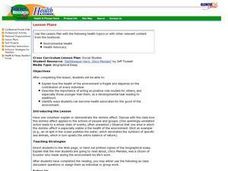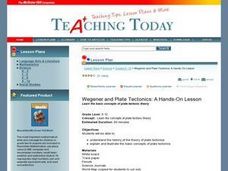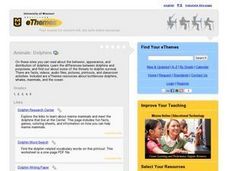Curated OER
Thermal Expansion
Learners examine how thermal expansion of water can affect sea level. They conduct an experiment that demonstrates what happens to water levels when exposed to heat, record the results on a data sheet, and discuss the results.
Curated OER
Ecosystems Connect
Students investigate ecosystems near their school and across the world. They examine both living (biotic) and non-living (abiotic) elements of each. They recognize ecosystems from various continents around the globe. The use of computers...
Curated OER
Blame It On El Nino
Students understand what the weather phenomenon El Nino is and what causes it. Students recognize how remote sensing technology can detect and predict El Nino. Students discover how El Nino effects weather conditions throughout the globe...
Curated OER
Biographical Essay
Tenth graders explore the importance of the environment and ow fragile it is.
Curated OER
Swim Like a Whale or Fish?
Students recognize the difference between whales and fish by categorizing them according to their method of swimming. They synthesize this information by simulating the swimming patterns of whales and fish and comparing it to their own.
Curated OER
Toilet Paper Geologic Time Scale
Students examine and demonstrate the extent of geologic time compared to recent time. They develop a demonstration of geologic time using an unrolled roll of toilet paper, with each sheet of toilet paper representing 20 million years.
Curated OER
Sand Collection and Identification
Students collect small amounts of sand from a favorite beach. They note the texture of the sand as fine or coarse and hypothesize why this might be. They research different kinds of sand grains and the conditions that produce them.
Curated OER
Pollutants on Coral
Young scholars consider the effects of acid pollution on coral reefs. They brainstorm previous knowledge about coral reefs, examine a piece of coral and observe its reaction to acid and list ways we can prevent pollution from reaching...
Curated OER
Civilizations of the Americas
Study and compare multiple aspects of both Aztec and Inca civilizations. Young historians explain how each of the empires came to be, and how they were both defeated by the Spanish. The resource starts out as a good lesson, but is...
Curated OER
Wegener and Plate Tectonics: A Hands-On Lesson
Students are introduced to and experiment with the basic concepts of plate tectonic theory as well as assess the history of the theory of plate tectonics. They explain and illustrate the basic concepts through diagrams and models of...
Curated OER
Oil Spill Dangers
Students analyze the effects of oil spills on our environment and develop action plans to protect animals and habitats.
Curated OER
Animals: Dolphins
Students use the internet to discover information about dolphins. They examine their behavior, appearance and distribution of dolphins.
Curated OER
Estuaries, Estuarine Habitats, and Adaptations
Students conduct research on estuaries. They design and construct an estuary, describe the physical characteristics of an estuary, and create a diagram illustrating an estuarine food web.
Curated OER
Lesson 9 - Along Our Coast
Young scholars study the benefits of estuaries. They construct a saltwater food web, and complete worksheets and a quiz.
Curated OER
Breaking Away (Or Not...)
Learners compare and contrast common reproductive strategies used by benthic invertebrates. They describe the most common reproductive strategies among benthic invertebrates on a seamount, and explain why these strategi
Curated OER
The Tides
Pupils experience a computer based applet that explains why the Earth experiences tides.
Curated OER
Pocahontas
Students, after studying about Pocahontas, identify ways they can deal fairly with others. Given various scenarios, students demonstrate proper social skills. They describe their contributions of peace to their family, school and community.
Curated OER
Beach Ball Striking
Students practice a variety of striking skills: "sweeping" the ball, passing to partners, and striking at a target. They review and address safety concerns with the use of a long-handled implement/stick and demonstrate how to hold the...
Curated OER
Water Issues on Puerto Rico and Oahu: A Comparison of Two Islands
Fifth graders explore how the tow islands receive and use fresh water. They also address some of the threats to the fresh water supply on each island. Students explore the lesson objectives through water cycle models and experiments.
Curated OER
Characteristics of Caribbean Islands
Students decide and record their stand on possible predictions of characteristics of Caribbean islands on a prediction guide. After the reading of the story, Isla, individual students record the correct true or false answer.
Curated OER
How High Does the Atmosphere Go?
Students explain how relatively thin the atmosphere is, compared to the size of the planet, and determine the relative extent of the four major atmospheric layers.
Curated OER
Drifting Continents
Students, through teacher-led demonstration, explore the idea of continental drift. They complete a worksheet involving the calculation of continental drift over time.
Curated OER
Hypothermia on the High Seas
Learners identify and present the effects on humans when the body temperature falls, demonstrate and explain how the body loses heat, and understand hypothermia and cold water survival techniques.
Curated OER
Carmel Point
Seventh graders read and analyze the poem "Carmel Point" by Robinson Jeffers. They read the poem online, use an online dictionary to define five words from the poem, and write a weather report summary for the Monterey-Carmel area....

























